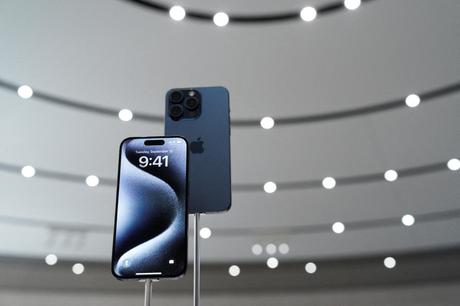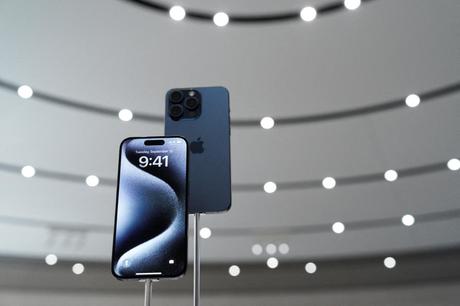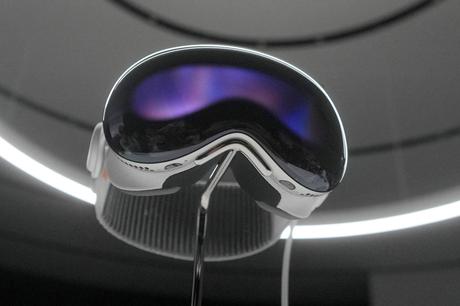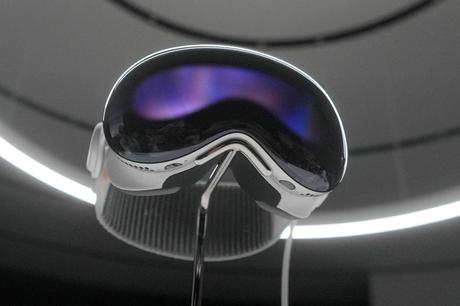We're less than a month into the new year, but it feels like it's been a lot longer for Apple (AAPL) viewers. The tech giant is making headlines left and right as it combines a handful of downgrades to its stock price, faces necessary major changes to its App Store policies and prepares for a potential antitrust lawsuit that could target large parts of its business.
All this comes as Apple prepares to launch its $3,499 Vision Pro headset. Apple's most ambitious product in years, the Vision Pro, catapults the company into a product category where even established players like Meta (META) are struggling to make a hit.
It's a lot, to say the least.
But it's not all doom and gloom for Apple. Generative, AI-enabled iPhones and a reacceleration of the company's services business should drive growth in the coming years. And if the Vision Pro takes off, it would create a whole new revenue stream for both Apple's hardware and services segments.
"I don't think in any way at this point that Apple is under any existential threat that didn't exist before," Gene Munster, managing partner of Deepwater Asset Management, told Yahoo Finance. "It's just that they participate in markets that do that [have] slower growth and they are looking for ways to stimulate that growth."
Apple's slowdown in China
China is Apple's third largest market, generating $72.6 billion of the company's total revenue of $383.3 billion in 2023. North America, Apple's largest market, generated $162.6 billion, while Europe generated $94.3 billion.
All of this makes reports of a slowdown in iPhone sales in China perhaps Apple's biggest and most pressing story. A sluggish economic recovery coupled with a resurgent Huawei, which has managed to launch smartphones with modern processors and features despite US sanctions, is expected to hurt Apple's market share in the country.
According to Counterpoint Research, the iPhone maker held 15% of the Chinese market in the third quarter of 2023. That was slightly better than Huawei's 14%, but behind Vivo's 16% and Oppo's 19%.
The story continues


Analysts at Barclays, Piper Sandler and Redburn Atlantic each pointed to the region as a potential problem for Apple, with Barclays' Tim Long saying the company was seeing "incrementally worse" iPhone 15 data from China. He also added that he doesn't predict "any features or upgrades that are likely to make the iPhone 16 more attractive."
Redburn Atlantic's James Cordwell also addressed China in a Jan. 10 letter, saying he remains concerned about Apple's competitive position in the country.
Piper Sandler's Harsh Kumar and Robert Aguanno said the deteriorating macroeconomic environment in China could negatively impact Apple's mobile phones.
"We emphasize in our outlook that China will be an important swing factor for sales next year," Aguanno told Yahoo Finance. "Any recovery in iPhone growth expectations will be fueled by the re-emergence of the Chinese consumer and by the outsized growth in other emerging markets such as India."
Antitrust concerns and App Store changes
Apple is also grappling with reports that the Justice Department is preparing to file an antitrust lawsuit against the company. According to the New York Times, the department could file the lawsuit, which would target Apple's strategic hardware and software moats, as early as March.


Critics have long called on antitrust enforcers to take action against Apple for instituting policies that prevent users from accessing apps from third-party app stores or prevent device and app makers from using certain hardware features of Apple's iPhone , such as mobile payment technology.
The European Union is also trying to force Apple to ease restrictions on its App Store, including allowing third-party app stores on the iPhone. The company has also introduced new App Store rules in the US that allow developers to advertise third-party links for making app purchases outside the App Store. Apple will still charge a commission on these sales, but will reduce the amount from 15% or 30% to 12% or 27%.
That drew sharp criticism from longtime rivals like Spotify, who say Apple's changes don't go far enough.
The Vision Pro is a risky bet
Apple's new Vision Pro AR/VR headset is also a key part of the 2024 equation. The device, which is available for pre-order and launches on February 2, is a huge gamble for Apple, as it seems to be entering a completely new market.
With a starting price of $3,499, the Vision Pro won't achieve the kind of sales volumes as the iPhone. And while early reports say pre-orders have sold out, there's no guarantee interest in the spatial computer will remain high.


"The initial sales data following the device's launch is encouraging for us, but we are still cautious about the long-term prospects for the device," Aguanno said. "It is still too early to say anything about this."
That said, Apple's long-term prospects remain strong, the analysts said. Bank of America analyst Wamsi Mohan told Yahoo Finance Live that he strongly believes Apple will continue to rise in the coming years.
"It's primarily about generative AI on iPhones," he says. "We think this will be an important catalyst." Mohan further added that he believes the Vision Pro will have long-term potential in terms of hardware and services.
Aguanno gave a similar view on the company's future prospects, saying Apple's market positioning and product lineup are solid.
We'll get our first taste of Apple's performance in 2024 when the company reports earnings on February 1.
Daniel HowleyClick here for the latest technology news that will impact the stock market. Read the latest financial and business news from Yahoo Finance is the technical editor at Yahoo Finance. He has been involved in the technical industry since 2011. You can follow him on Twitter @DanielHowley.